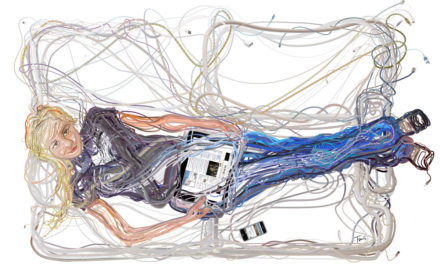Well, it’s that time again- Christmas tunes in the mall, white lights down Eagle Row, and the classic stitched sweater with images of candy canes and reindeer on them. But what about that other holiday: Hanukkah?
If you want a full debriefing on the truth and the story behind the age-old Jewish holiday, then turn to page A21 of Saturday’s NY Times. But instead, I thought I’d offer something a bit less historical.
Hanukkah celebrates the classic “David and Goliath”esque tale between good and evil and big and small, as ultimately the small-outnumbered Maccabean army defeated the overpowering and overbearing Greeks in the 2nd Century BCE. Or does it celebrate the miraculous act of God, having the ancient Temple Menorah remain lit for eight days, even though it had the oil for just one? Some religious and academic sources will say that the only reason the Menorah was lit was in honor of the Maccabean victory over the Greeks. And as for the eight days, it was not because of any oil miracle but rather to remember the eight days of the Jewish holiday of Sukkot, which occurred a month earlier that they were forbidden to celebrate.
Beyond the true reason we celebrate the holiday, Hanukkah continues to have a “hazy” quality. As Hilary Krieger writes in her Times article: “Hanukkah is one of the most widely celebrated Jewish holidays in America. But unlike Rosh Hashana, Yom Kippur and Passover, all of which are explicitly mentioned in the Torah, Hanukkah gets only a brief, sketchy reference in the Talmud, the voluminous collection of Jewish oral law and tradition written down hundreds of years after the Maccabees’ revolt.”
So if Hanukkah has such a mysterious and rather vague origin, then what are we really celebrating and why so? In the late 19th century and much of the 20th century, Hanukkah was used to satisfy those kids who were longing their own Santa Claus and gift-giving. Hanukkah was never meant to be associated with luscious presents and definitely not eight days of them, but rather small monetary gifts that mostly came out of “gambling” and dreidel playing. So maybe instead of a concrete holiday that fits in the category of the more “holy” holidays (whatever holy really means), perhaps Hanukkah is more of a mental concept and/or state of being. Hanukkah gives Jews (and non-Jews), an inner gratification that miracles do exist. I don’t write that trying to come off as a skeptic or a cynic, because trust me, I’d love to win the lotto or walk on water. But, are those really miracles or just a long-awaited and highly unlikely set of coincidences?
Perhaps we use Hanukkah to remind ourselves about all of the everyday “miracles” around us. Okay, that may sound cheesy- but it’s the simplest way of saying it. We light menorahs (officially ‘chanukiyahs’ in the proper Hebrew), we sing songs, have holiday meals, buy loved ones gifts, and most importantly embrace our faith.
Saturday night, all of the Emory Jewish community joined together at Asbury Circle to light the first candle and recognize the first night of Hanukkah. There are three blessings that are recited on the first night of Hanukkah, but I’m most concerned with the second one. In English the prayer is translated as: “Blessed are you, Lord our God, Ruler of the universe, who wrought miracles for our fathers in days of old, at this season.” This prayer is only said one other time, which is during the Jewish holiday of Purim, where Jews remember how God miraculously saved us from execution (hint: the common theme is miracles). My question is why does the Hebrew say “bayamim hahem” “in those days”? Are we not supposed to recognize and be thankful for miracles of today? Of course to amend this prayer (a radical idea), it would need to say something to the effect of “in those days and today,” but I wouldn’t put my money on that happening any time soon.
So, 700 hundred words later what am I babbling about? I think my point is that Hanukkah has morphed from a holiday born out of recognizing and remembering one or both of God’s miracles from the 2nd Century BCE, to a Jewish supplement to Christmas, and perhaps today really is to both recognize and remember the miracles “in days of old,” but also of today. We recently marked the one-month “anniversary” (if it’s even politically correct to call it that) of Hurricane Sandy, and the devastation it left behind. The Atlantic City pier is still subaqueous, and the people of Long Beach, New York are still homeless, so perhaps miracles “of these days,” wouldn’t seem on face appropriate, or would it? Let’s say thanks for what we have today, our health, our family, our friends, and just about everything in between.
I’m not sure if a check or a gift card really embodies that message, so perhaps when you say “she’asah nissim,” each night, you will have in mind not only the miracles of the past, but those in present, and hopefully, the future.
Brett Lichtenberg is a College freshman from Hewlett, N.Y.
The Emory Wheel was founded in 1919 and is currently the only independent, student-run newspaper of Emory University. The Wheel publishes weekly on Wednesdays during the academic year, except during University holidays and scheduled publication intermissions.
The Wheel is financially and editorially independent from the University. All of its content is generated by the Wheel’s more than 100 student staff members and contributing writers, and its printing costs are covered by profits from self-generated advertising sales.




Chag Sameach!!